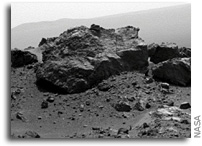Why Can’t Everyone Get A Chance To Name Things on Mars?

Mars Rover Opportunity continues its travels across the surface of Mars. Recently, it arrived on the rim of a huge crater named “Endeavour”. According to NASA “Opportunity had arrived at the western rim of 13-mile-diameter (21-kilometer-diameter) Endeavour crater four days earlier. A portion of the northeastern rim of Endeavour forms the distant horizon in this view. A crater about 66 feet (20 meters) in diameter is on the Endeavour rim near Opportunity’s arrival point. From a position south of Odyssey, this view is dominated by a rock informally named “Ridout” on the northeastern rim of Odyssey. The rock is roughly the same size as the rover, which is 4.9 feet (1.5 meters) long.”
It has been a long tradition among planetary scientists to name prominent features that their missions discover – if for no other reason than to make navigation easier. According to Mars rover principal investigator Steve Squyres: “None of these names are ‘official’ in any sense. Selecting the official names of features like craters on other planets is the purview of the International Astronomical Union. None of our names — including the names of the craters — are official IAU names. They are simply names that we have chosen out of necessity for use within the team during the mission. Unless you have some names to use for the things you’re looking at and driving by, things get pretty confusing.”
Why shouldn’t these names be “official”? People have been naming places on Earth since people started to speak. Terrestrial exploration has a rich tradition of allowing the discoverers to name the things that they discover. There are lots of things that appear in these pictures that have yet to be named. Why can’t everyone have a shot at naming things – including the taxpayers who paid for the missions? Why should naming things on other worlds be the “purview” of an elite group like the IAU – one that answers only to itself?








